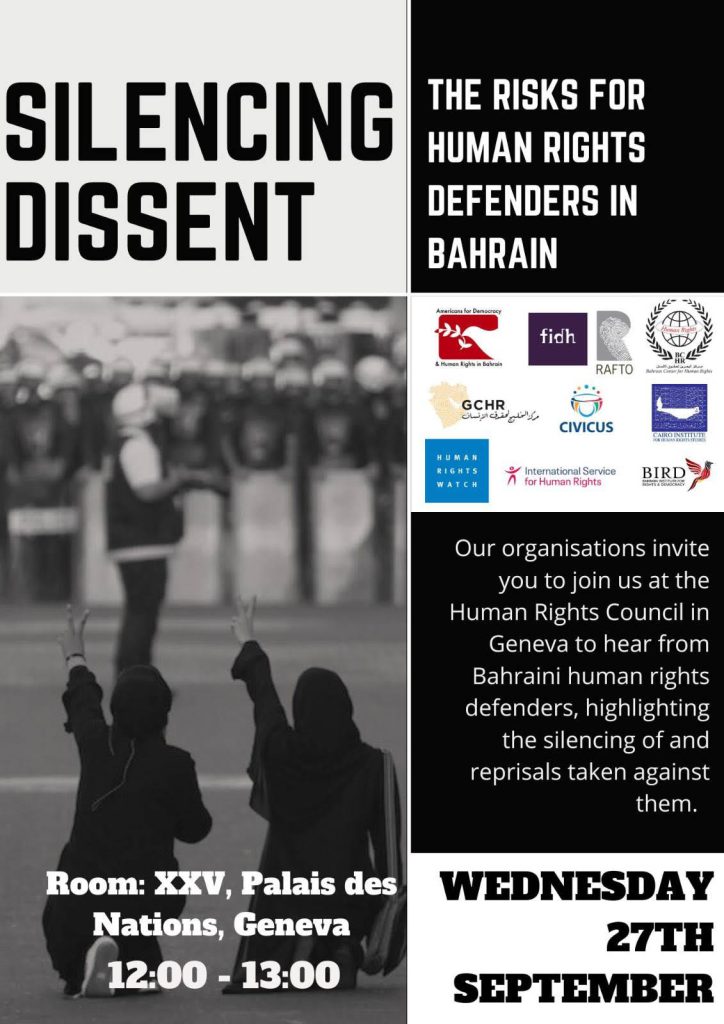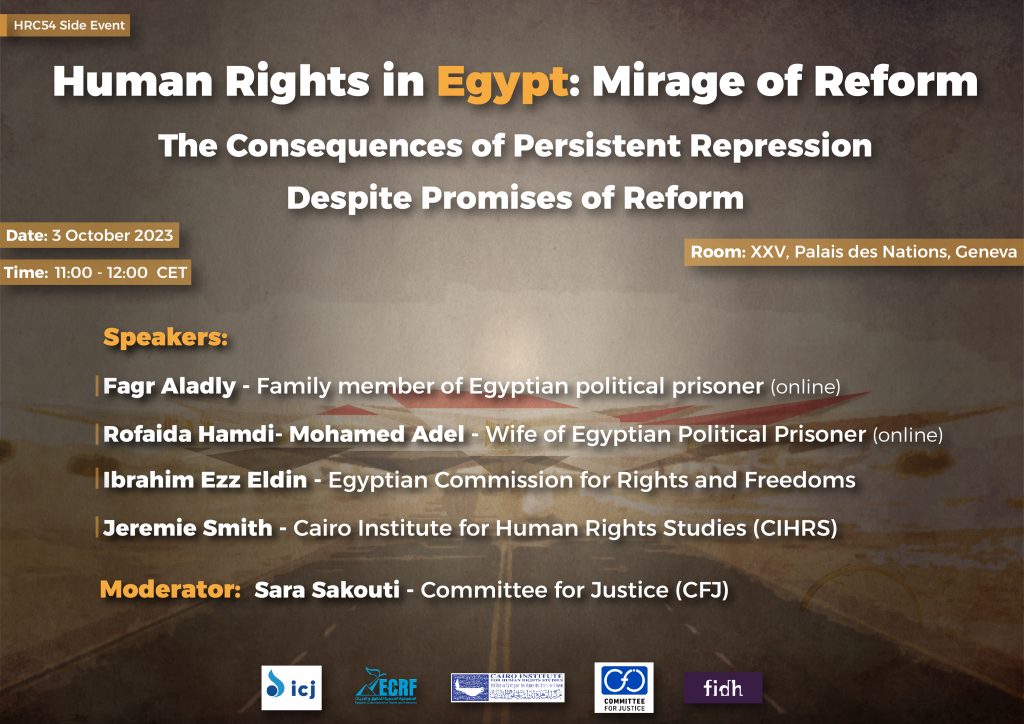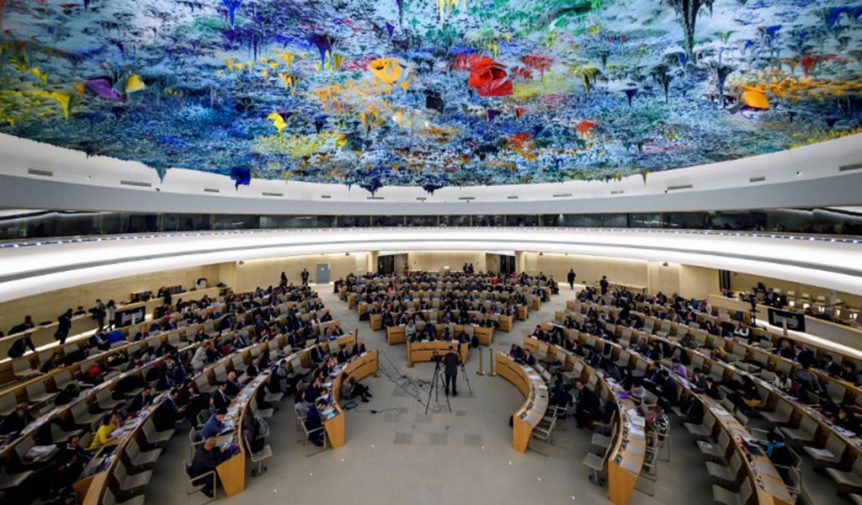The 54th session of the United Nations Human Rights Council (UNHRC) concluded on 14 October 2023, coinciding with several major human rights developments in the Middle East and North Africa (MENA) region. Among these developments was the adoption of a resolution forming an independent international mechanism to investigate the conflict in Sudan. The UNHRC resolution was adopted by a majority of votes (19 countries) despite opposition from the Sudanese government and the Arab Group. The resolution represents an initial step towards accountability for all parties perpetrating human rights violations and crimes in Sudan. Many civil society organizations, including the Cairo Institute for Human Rights Studies (CIHRS), advocated for its adoption, including in a joint letter that was presented on 15 September in a public parallel event on the sidelines of the 54th session.
In contrast, the UNHRC failed to take action on several critical human rights situations throughout the MENA region, including Yemen, Libya, Egypt, Algeria, Bahrain, as well as Palestine and Israel.
In an event at the United Nations on 6 October, civil society organizations, with the participation of representatives of states and diplomatic missions, renewed their demand for a resolution forming an independent investigative mechanism on Yemen. In a statement before the UNHRC on 10 October, CIHRS warned that the Council’s silence on Yemen severely undermines its legitimacy and effectiveness. CIHRS addressed the ineffectiveness of the resolution adopted during this session on Yemen, in regards to its complete disconnection from the human rights crimes and violations against the Yemeni people.
In conjunction with the outbreak of violent confrontations in Palestine and Israel, which began in the last week of the session (7 October 2023), CIHRS and several human rights organizations denounced in a joint statement the failure of the UNHRC to effectively address the mass killings of civilians in Palestine and Israel. The organizations called for an independent investigation committee to investigate attacks against civilians and other violations, including Israel’s extended siege of the Gaza Strip, its long-term occupation and apartheid policies, and its deliberate denial of the basic rights of the Palestinian people to self-determination and return. The organizations called on governments to immediately stop providing political and military support to Israel after genocidal intent against Palestinians was expressed by Israeli officials. The organizations also condemned the dehumanization and deliberate neglect of crimes committed against Palestinian civilians. The organizations further called on the international community and member states to ensure immediate access to humanitarian aid to the besieged Gaza Strip, and to hold all actors who have violated international law to account .On 3 October 2023, Israel’s e UN Universal Periodic Review (UPR) report was adopted at the HRC. During the adoption, Israel rejected the criticism of its human rights record, whether from member states or civil society organizations. Israel further claimed that many of the UPR recommendations were of a political nature and could not be complied with. CIHRS condemned Israel’s continued denial of its crimes and the failure of the international community to hold it accountable in an oral statement before the UNHRC. CIHRS, in cooperation with partner organizations, previously submitted three reports on Israel to the UPR process, refuting the most prominent crimes and violations committed by Israel since the previous review in 2018 until 2023.
Jeremie Smith, Director of the Geneva Office of CIHRS said, “The ongoing international crimes committed in Israel and Gaza, which has claimed thousands of civilian lives, is the direct result of long-standing impunity for crimes being committed in the Occupied Palestinian Territories, including Israel’s Apartheid against Palestinians and permanent occupation of the OPTs. It is critical that UN member states begin to ensure the rule of law is adhered to by all parties – including by ending Israel’s ongoing bombing campaign and “complete siege” of Gaza – actions that put 2.2 million Palestinians in imminent danger and constitute war crimes under international law.”
The results of international impunity extends to Liby as well, during the recent devastating floods and a major humanitarian catastrophe in Derna. Despite being largely preventable, the immense death toll during the disaster is largely due to corrupt, unaccountable and non-democratic governance which failed to provide even the most basic services to infrastructure or civilians within the area. On 2 October 2023, CIHRS and its partners held a public event on the sidelines of the HRC. During the event, a group of Libyan human rights defenders addressed the repressive legal framework that has reduced civic space, the repeated violations during local elections, the complete paralysis of the national judicial system and its inability to hold perpetrators of war crimes and crimes against humanity accountable. Libyan activist Cher Saadi, who was forced to flee after facing threats for her civil society work, spoke before the UN and called for the urgent resumption of investigations into human rights violations in Libya, warning that failure to implement this will only encourage armed groups to commit more violations.
CIHRS co-organized an event on the sidelines of the session to address the worsening conditions of human rights defenders in Bahrain. Hundreds of political prisoners in Bahrain, including prominent human rights activist Abdulhadi al-Khawaja, announced a hunger strike in protest against their continued arbitrary detention, ill-treatment and deliberate medical neglect in Bahraini prisons, as part of the government’s extended retaliatory practices against human rights defenders and opposition political activists. CIHRS and fourteen human rights organizations demanded that the situation of prisoners in Bahrain be addressed during the 54th session, in a joint letter to the permanent missions of United Nations member states prior to the session. In an oral statement on behalf of CIHRS before the UNHRC, human rights activist Ebtisam al-Saegh further addressed the reprisals she was subjected to for her human rights work, including arbitrary arrest, sexual assault, torture, security campaigns and harassment, and the resulting moral, health, and material losses.

This session witnessed the UN Special Rapporteur presenting a report on reprisals against persons collaborating with the United Nations and its representatives. The UN Special Rapporteur further pointed to the restrictions and physical and online surveillance imposed on human rights defenders throughout the MENA region, with an aim to punish or deter cooperation with the United Nations, including in Bahrain and Egypt. The HRC also adopted a resolution on the right to privacy in the digital age, including strong new standards for data protection and the recognition of concerns about repressive regimes using remote surveillance systems to retaliate against their opponents.
In regards to the human rights situation in Egypt, CIHRS further addressed attacks against human rights defenders and government critics, including political parties, amid approaching presidential elections. CIHRS previously described the elections as having no possibility of integrity or freedom, in a public parallel event titled “The Mirage of Reform,” which addressed the consequences of ongoing repression in the country. Speakers at the event reviewed various cases of reprisal against them and their families due to their opposition against the Egyptian government’s policies. In an oral statement before the UNHRC, CIHRS affirmed that the current severe crackdown on basic freedoms in Egypt reflects the Egyptian government’s lack of genuine political will to address the human rights crisis- a lack of will that will only be further encouraged by the silence of the UNHRC and member states.

During the 54th session, CIHRS engaged with the UN Commission of Inquiry on Syria. In a statement before the HRC, CIHRS praised COI for its ongoing work towards accountability for war crimes and crimes against humanity committed in Syria, while also expressing deep concern about the attempts of some UN member states, including members of the Arab League, to weaken attempts to ensure international accountability for crimes committed by normalizing relations with the Syrian government despite its primary culpability for crimes against humanity and human rights violations against the Syrian people.
During a UNHRC discussion on “religious hatred” on 5 October, CIHRS warned of attempts by the Organization of Islamic Cooperation to import highly repressive religious blasphemy laws into the international human rights framework, and how such laws are used to restrict the right to freedom of expression and freedom of belief, including the persecution of religious minorities, and called on the international community to resist these efforts in order to preserve universal rights standards.
The UNHRC 54th session started on 11 September 2023. CIHRS, together with partner organizations, held nine oral interventions, and five parallel events on the sidelines of the session, all of which addressed human rights issues in seven countries of the region: Sudan, Yemen, Libya, Egypt, Bahrain, Palestine and Syria.
Share this Post

